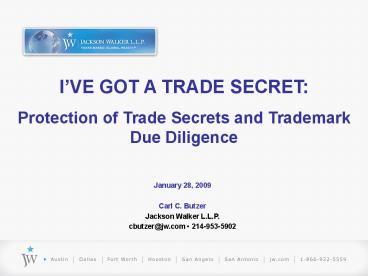I - PowerPoint PPT Presentation
1 / 26
Title: I
1
IVE GOT A TRADE SECRET Protection of Trade
Secrets and Trademark Due Diligence
January 28, 2009 Carl C. Butzer Jackson Walker
L.L.P. cbutzer_at_jw.com 214-953-5902
2
Trade Secrets
- A trade secret is really just a piece of
information (such as a customer list, or a method
of production, or a secret formula for a soft
drink) that the holder tries to keep secret by
executing confidentiality agreements with
employees and others and by hiding the
information from outsiders by means of fences,
safes, encryption, and other means of
concealment, so that the only way the secret can
be unmasked is by a breach of contract or a
tort. - ConFold Pac., Inc. v. Polaris Indus., Inc., 433
F.3d 952, 960 (7th Cir. 2006).
3
Laws Protecting Trade Secrets
4
The UTSA the Restatements
Massachusetts New Jersey New York Texas
Restatement of Torts 757 (1939)
Uniform Trade Secrets Act (1979, amended 1985)
Restatement (Third) of Unfair Competition
39-45 (1995)
46 states D.C.
5
Liability Under the UTSA
- the information at issue was a trade secret and
- the information was misappropriated.
6
Trade Secret Defined
- A trade secret consists of a formula, process,
device, or compilation which one uses in his
business and which gives him an opportunity to
obtain an advantage over competitors who do not
know or use it. - Restatement of Torts, 757
- . . . information, including a formula, pattern,
compilation, program, device, method, technique,
or process that (i) derives independent
economic value, actual or potential, from not
being generally known to, and not being readily
ascertainable by proper means by, other persons
who can obtain economic value from a disclosure
or use, and - (ii) is the subject of efforts that that are
reasonable under the circumstances to maintain
its secrecy. - Uniform Trade Secrets Act (UTSA)
7
Trade Secret
- Information that
- is not generally known in industry
- the owner has made appropriate efforts to keep
secret and - confers a competitive advantage by being kept
secret.
8
Information Capable of Trade Secret Protection
- Formulas
- Devices
- Software
- Know-how
- Compilations
- Designs
- Processes
- Customer Lists
- Pricing Information
- Negative Information
9
Six Factors Used By Courts to Determine Trade
Secret Status
- Extent known outside business
- Extent known inside business
- Measures taken to guard secrecy
- Value of the information
- Amount of effort/money expended in developing the
information and - Ease or difficulty with which the information
could be properly acquired or duplicated by
others.
10
Reverse Engineering
- Reverse engineering of chemical . . . articles
in the public domain often leads to significant
advances in technology. - Bonito Boats, Inc. v. Thunder Craft Boats, Inc.,
489 U.S. 141, 160 (1989).
11
Secrecy
- Courts are entitled . . . to economize on their
scarce resources of time and effort by refusing
to help a secret holder who failed to take
minimum steps to protect his secret before
running to court. - BondPro Corp. v. Siemens Power Generation, Inc.,
463 F.3d 702, 708 (7th Cir. 2006).
12
Protecting Trade Secrets
- Reasonable efforts to maintain secrecy have
been held to include advising employees of the
existence of a trade secret, limiting access to a
trade secret on need to know basis, and
controlling plant access. - UTSA cmt. 1
13
How Does the Company Protect its Trade Secrets?
- Based on the lack of repeated losses of
confidential information regarding the process
and the plaintiffs use of physical security,
limited access to confidential information,
employee training, document control, and oral and
written understandings of confidentiality, the
Court concludes that the plaintiff subjected
the process to efforts that are reasonable
under the circumstances to maintain its secrecy. - Wyeth v. Natural Biologics, Inc., 395 F.3d 897,
900 (8th Cir. 2005) (process for producing bulk
natural conjugated estrogens used in the
development of Premarin)
14
Protecting Trade Secrets
Employees
Trade Secrets
15
Protecting Trade Secrets
Employees
- Need to Know
Trade Secrets
16
Protecting Trade Secrets
Employees
- Need to Know
- Compartmentalize
Trade Secrets
17
Protecting Trade Secrets
Employees
- Need to Know
- Compartmentalize
- Contracts
Trade Secrets
18
Protecting Trade Secrets
Employees
- Need to Know
- Compartmentalize
- Contracts
- Transient
Trade Secrets
Competitors
19
Protecting Trade Secrets
- Limited Access
- Secure
- Pass Codes / Encryption
Employees
- Need to Know
- Compartmentalize
- Contracts
- Transient?
Trade Secrets
X
X
20
Protection Measures
- Internal Policies
- Education training
- Monitoring compliance
- Physical security
- Isolation of the trade secrets
- Limit Access (employee mobility/turnover?)
- Agreements
- Quality and character of licensees, industry
- Immediate legal action
21
Resources on Trade Secrets Laws Opinions
- The Trade Secrets Vault http//www.tradesecretsblo
g.info/ - Jorda On Trade Secrets The Interface Between
Patents Trade Secrets http//jordasecrets.com/ - Citizen Media Law Project Trade Secrets
http//www.citmedialaw.org/legal-guide/trade-secre
ts - Full-text state statutes and legislation on the
Internet http//www.prairienet.org/scruffy/f.htm
22
Trademark Due Diligence
- Quick self-search http//www.uspto.gov/main/trade
marks.htm - Investigate TTAB proceedings http//ttabvue.uspto
.gov/ttabvue/ - Independent trademark search e.g., http//
www.compumark.thomson.com/
23
(No Transcript)
24
(No Transcript)
25
Trademarks Identifying potential competitors,
infringers, and counterfeiters with similar
trademarks
- Internet searches
-
- Register appropriate domain names
- Register marks with U.S. Customs
26
How has the Target Company Monetized its
Trademarks?
- Collateralization of Trademarks
- Securitization of trademarks (securitization
loans based on licensing revenues)































